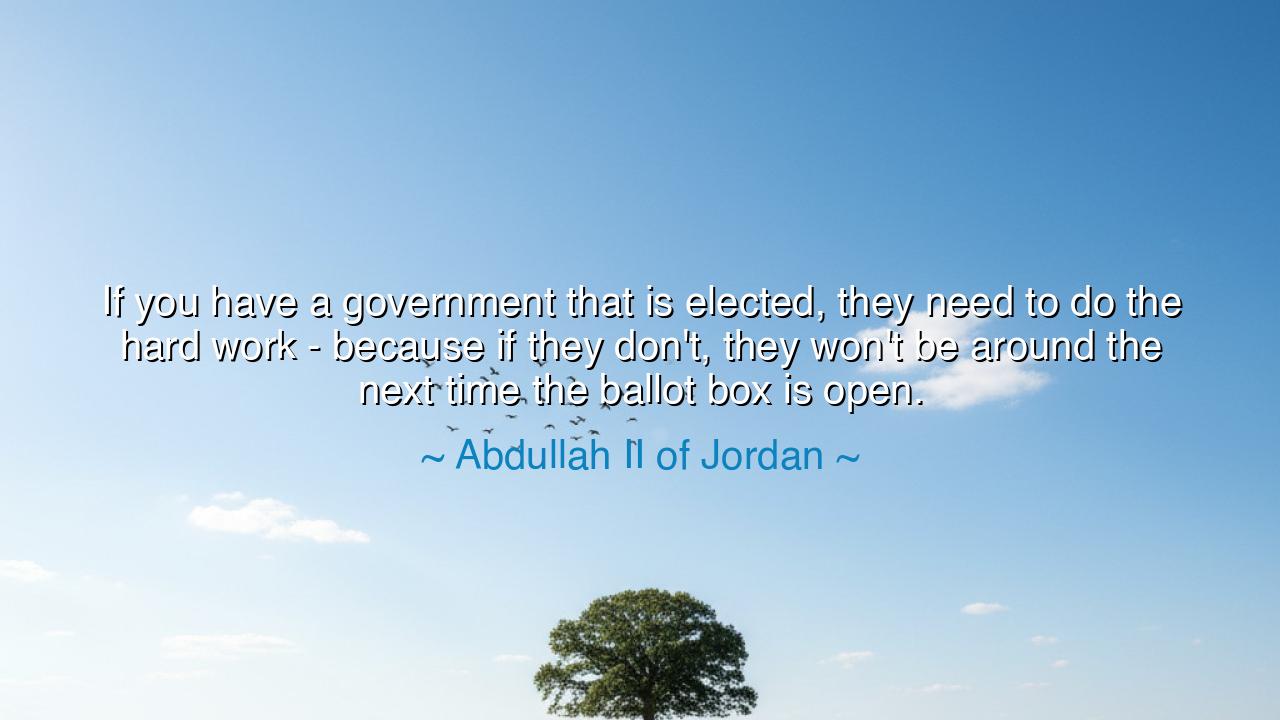
If you have a government that is elected, they need to do the
If you have a government that is elected, they need to do the hard work - because if they don't, they won't be around the next time the ballot box is open.






Hearken, children of governance and seekers of wisdom, to the words of Abdullah II of Jordan, who proclaimed with clarity and authority: "If you have a government that is elected, they need to do the hard work - because if they don't, they won't be around the next time the ballot box is open." In this statement lies an enduring truth: leadership demands diligence, responsibility, and accountability, and the people are the ultimate guardians of power, wielding the ballot as both sword and shield.
The origin of Abdullah II’s insight springs from his observation of the delicate dance between rulers and the governed. In societies where authority is granted through election, the mandate to govern is both a privilege and a burden. It is not enough to occupy office or display ceremonial grandeur; true leadership requires action, vigilance, and the courage to confront challenges with steadfast determination. Failure to do so invites the judgment of those who entrusted the government with their voice.
Consider the imagery of the ballot box, a symbol as ancient as the assemblies of Athens and the councils of Rome. Here lies the ultimate instrument of accountability, a means by which citizens affirm or revoke trust. Abdullah II reminds rulers that authority is transient if not exercised with wisdom and dedication. Leadership is a contract with the people; it is earned daily, not assumed for a term, and the consequences of neglect are immediate and inexorable.
History provides vivid exemplars of this principle. Recall Pericles of Athens, whose leadership during the golden age depended not only on vision, but on diligent attention to civic administration and military affairs. Had he neglected his duties, the assembly would have turned its favor elsewhere, and the city-state might have faltered. Similarly, in modern times, leaders who fail to respond to public needs—whether in times of economic crisis or social unrest—face electoral defeat, as the people exercise the sacred power of judgment.
Abdullah II’s words also illuminate the moral dimension of leadership. Governance is not merely the execution of policy; it is the service of the people with integrity, courage, and foresight. The elected official is a steward, entrusted with the welfare of many, and must labor tirelessly to fulfill that trust. Neglect, laziness, or self-interest erodes legitimacy and invites the rightful intervention of the populace through democratic processes.
The lesson is clear and enduring: authority is both responsibility and accountability. Leaders must labor diligently, engage with the concerns of citizens, and anticipate challenges with wisdom. To do less is to risk removal, and to shirk duty is to betray not just an office, but the covenant of trust that sustains society. The people’s voice is not a mere formality—it is the measure of leadership’s success or failure.
Practical actions emerge naturally: for those who govern, embrace hard work, transparency, and responsiveness; for citizens, exercise vigilance, engagement, and discernment in evaluating leaders; cultivate systems that reward diligence and integrity; and remember that democracy is sustained not by rhetoric, but by consistent, accountable action. Leadership is earned through labor and tested by the ballot, and this cycle is the lifeblood of a thriving society.
In sum, Abdullah II teaches that governance is a sacred trust, maintained through diligence, foresight, and service. Authority that is passive, neglectful, or self-serving will not endure, for the people hold the ultimate power in their hands. Let this wisdom guide both rulers and citizens alike, ensuring that leadership is not a prize to be hoarded, but a responsibility to be exercised with courage, diligence, and moral clarity.
If you wish, I can craft an even more epic, mythic version, turning Abdullah II’s insight into a heroic narrative about the responsibilities and trials of leadership, perfect for immersive audio storytelling. Do you want me to do that?






AAdministratorAdministrator
Welcome, honored guests. Please leave a comment, we will respond soon